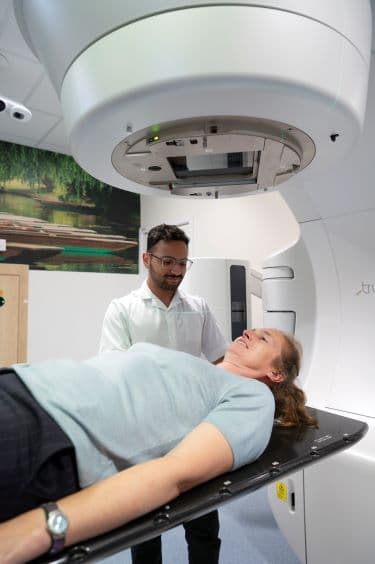Having radiotherapy
In the UK, clinical oncologists are doctors who specialise in treating cancer with:
radiotherapy
simple chemotherapy
other drug treatments
In some other countries, such as the USA, they are called radiation oncologists.
Your clinical oncologist works as part of a (MDT). This is with other health professionals who are specialists in cancer treatment and care. This MDT may include:
a surgeon
a doctor specialising in cancer drug treatment (a medical oncologist)
paediatric oncologist for children
therapeutic radiographers - they plan and deliver radiotherapy to people with cancer
doctors who specialise in taking and reading x-rays and scans (radiologists)
doctors who look at body tissues to diagnose illness (pathologists)
specialist nurses
physiotherapists
dietitians
speech and language therapists
other health care staff such as occupational therapists or social workers
While you are having radiotherapy you are in the care of a clinical oncologist. Your oncologist approves your radiotherapy plan. They also prescribe and supervise your treatment. You see them, or a member of their team, regularly throughout your treatment.
Between these appointments, you may see a specialist nurse or radiographer. One member of the team will be your main contact. You can speak to them if you need any information.
You might still see your own GP during and after your radiotherapy. It is important to let your GP know you are having radiotherapy.
The medical team that prescribes and plans your radiotherapy work together with specialist scientists. They are also known as medical physicists, dosimetrists or clinical scientists.
Medical physicists advise on the best way to give the amount of radiation prescribed. And how long you need treatment from a particular radiotherapy machine to get the right dose. They also make sure the radiotherapy equipment is accurate and safe.
A physicist or therapeutic radiographer specialised in planning, create your radiotherapy plan.
You might not meet any of these people. But you could meet the physicist if you have internal radiotherapy.
Therapeutic radiographers operate the machines that give you your treatment. They are trained in radiotherapy and patient care. They work with the oncologist and physicist to plan and deliver your treatment.
The staff try to make sure you have some of the same radiographers throughout your treatment. This is so you get to know each other. They can give you advice about your treatment and arrange for you to see a doctor.
You can ask them anything you are worried or anxious about. They can give you advice on coping with any side effects.

The radiotherapy clinic have nursing staff, usually a charge nurse (or sister) and a team of nurses. They look after your general needs, such as:
dressings
medicines
information about coping with side effects
They also give you advice and practical support.
Social workers can advise about any problems you may have with:
practical matters
money issues
getting counselling and emotional support for you and your family
They may refer you to local agencies who can help you at home. Some people can claim travel expenses. Others may apply for a grant from a charity.
Find out about financial support
Many hospitals have a symptom control team. They support and help people whose symptoms or treatment are causing them problems.
They also link up with nurses who can continue to see you at home.
Last reviewed: 20 Oct 2023
Next review due: 20 Oct 2026
Radiotherapy is a treatment for cancer. It can be used to try to cure cancer, reduce the chance of cancer coming back or to help relieve symptoms.
Internal radiotherapy means having radiation treatment from inside the body. It is also called brachytherapy. Read more about what it is and how you have it.
External radiotherapy targets radiation at the cancer from a radiotherapy machine. Read about types of external radiotherapy and what happens during planning.
Radiotherapy can cause different side effects depending on which part of the body is being treated. Find out what these side effects are and how they affect you during and after treatment.
Find out about cancer treatment with radiotherapy, including external radiotherapy, internal radiotherapy, side effects, radiotherapy for symptoms and follow up after treatment.
Search for the cancer type you want to find out about. Each section has detailed information about symptoms, diagnosis, treatment, research and coping with cancer.

About Cancer generously supported by Dangoor Education since 2010. Learn more about Dangoor Education
Search our clinical trials database for all cancer trials and studies recruiting in the UK.
Connect with other people affected by cancer and share your experiences.
Questions about cancer? Call freephone 0808 800 40 40 from 9 to 5 - Monday to Friday. Alternatively, you can email us.